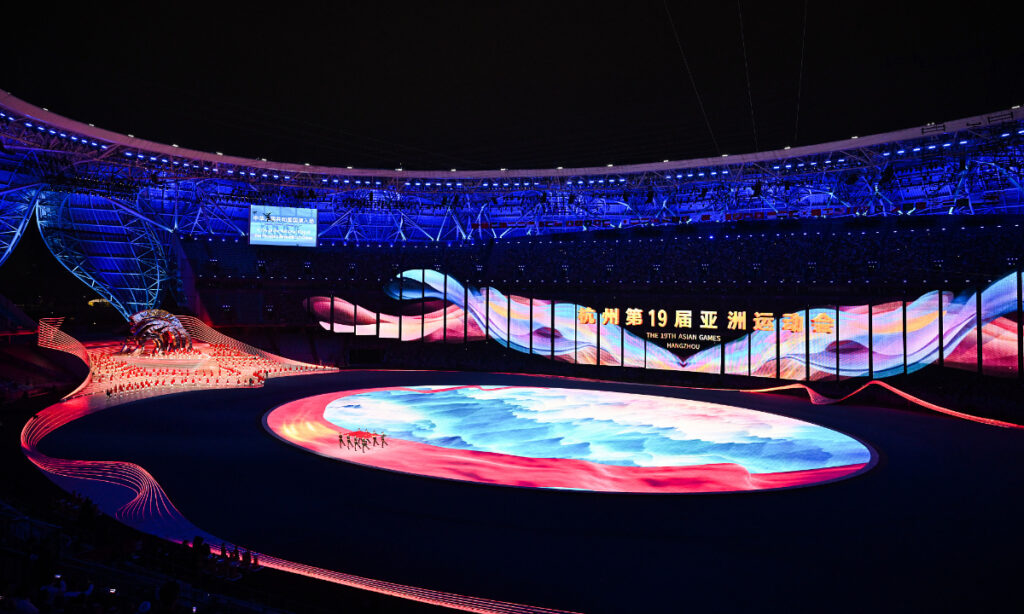On Saturday, the day of Autumn Equinox, one of the traditional Chinese solar terms, the 19th Asian Games opening ceremony began with the “Water Jade Cong” drums beating out the exciting sound of water to welcome the guests at Hangzhou Olympic Sports Centre Stadium, nicknamed “Big Lotus.”
In Hangzhou, the opening ceremony displays the melody and rhythm of water. Themed “Tides of Asia,” the ceremony shows that China’s mingling and mixing with Asia and the world like a wave forever rushing forward. By interpreting the many variations of “water,” the performances highlight the surging upward movement of the “tide.”
A passionate collision between the millennium civilization and modern technical visual effects demonstrates the heritage of a Chinese-style romance, while the symbiosis of oriental aesthetics and international vision reveals the struggle for Chinese modernization.
With the interplay of Chinese and Asian styles, it conveys to the audience a vision of building the community with a shared future.
As the athletes from 45 countries and regions stepped into the venue, the large floor screen outlined the shape of a regimental fan, greeting them with a unique Jiangnan flavor. Drums of osmanthus flowers were played with excitement, accompanied by Chinese folk music playing to cheer on the athletes. Meanwhile, the audience at the venue kept applauding the athletes of all countries.
“To the spectators and the people of Hangzhou, we say “Xie Xie”, for your warm welcome, your hospitality and your friendship,” Raja Randhir Singh, acting president of the Olympic Council of Asia (OCA), said at the opening ceremony of the 19th Asian Games. He also expressed his appreciation to the Organizing Committee (HAGOC), expecting them to be rewarded with “the most magnificent and successful Asian Games ever.”
Chinese President Xi Jinping then declared the 19th Asian Games open.
A presentation of the three chapters was then put on. This was combined with the traditional Chinese elements of “qin, chess, calligraphy, painting, poetry, wine and tea” being put into the props, while VR, AR and virtual imaging lanterns flew into the sky, symbolizing the unity of all Asian people.
After the breathtaking presentation showing the collision of the tides of national style, nature, science and technology, sports, and the tide of the times, the main torch was lit jointly by Olympic champion swimmer Wang Shun and over 100 million “digital torchbearers.”
Digital and green ceremony
On top of the spectacular images and heartwarming moments, this opening ceremony also combined the avant-garde practice of digital technology and green energy.
Creating stunning visuals with digital technology has also become the highlight of the opening ceremony. In this opening ceremony, the Qiantang River and iconic Gongchen Bridge connecting ancient and modern times were directly projected onto the stage through the coordination of ground screen and stereoscopic screen, and through the design of naked eye 3D visual effects and virtual images. The integration of naked-eye 3D technology, augmented reality (AR), and artificial intelligence (AI) has brought a fresh and exciting experience to viewers worldwide.
The main torch lighting form of the opening ceremony of large-scale sports events has always attracted much attention. At the opening ceremony of the Hangzhou Asian Games, the “virtual and reality integration” lighting ceremony was displayed for the first time, showcasing the technological innovation of the intelligent era.
For the last part of the ceremony, hundreds of millions of people across Asia were full of enthusiasm to witness the torchbearer, Wang Shun, and the “digital torchbearer” light the main torch tower together.
Each online participant is a point of light that converges on the Qiantang River to form a figurative “digital person” who meets with the torchbearer at the main venue to light the main torch tower. This demonstrates the resonance between the digital world and the real world, and expresses the wish for a community of common destiny in Asia to be built.
The Global Times learned that, the “digital torchbearer” online torch relay activity was launched simultaneously with the real torch relay. Before the opening ceremony, the online Asian Games “digital torchbearer” total number has exceeded 104 million.
Zhang Shaorong, General Manager of the Alipay Asian Games Office of Ant Group, told the Global Times on Saturday that there are very few Internet platforms in China that have undertaken such large-scale online activities in the past.
Currently, most of the mainstream 3-D interactive engines in the market, such as Unity and Unreal Engine, are developed by foreign manufacturers, but these “heavyweight” products have high requirements for mobile devices, Fang Kai, user and public welfare director of Ant Group’s Alipay technology department, told the Global Times.
“It becomes very important to develop a lightweight, high-efficiency and high-quality Web3-D engine to create a digital torchbearer platform for the Asian Games that everyone can participate in,” Fang noted.
In order to ensure the smooth operation of new and old models, Alipay’s project team set up a large-scale test room. Using hundreds of cell phones of different ages and models, the team conducted more than 100,000 tests to help the Hangzhou Asian Games achieve the goal of “everyone can become a digital torchbearer through a cell phone.”
“We hope that tens of thousands of people can also participate in the opening ceremony and be part of the live performance,” said Sha Xiaolan, chief director of the opening ceremony of the Hangzhou Asian Games. “This also demonstrates that the Hangzhou Games is a smart Asian Games, to create the classic memory of the Asian Games with the power of scientific and technological innovation.”
It is amazing that the main torch is the first in the world to be lit with green zero-carbon methanol. At the same time, the opening ceremony brought a visual feast to the world through digital technology with brilliant electronic fireworks.
The spectacular opening ceremony of the Hangzhou Asian Games gathered popularity, reflecting China’s ability and sincerity as an important power in Asia to organize such a sports event so that the Asian people can share the glory of the event, Zhang Yiwu, a professor from the Peking University, told the Global Times.
Analysts pointed out that the opening ceremony fully demonstrated the beauty of Hangzhou, such a famous Chinese historical and cultural city, while also reflecting Hangzhou and China’s tradition of hospitality, openness and tolerance, which is a trait of Chinese civilization.
“It’s not about just promoting Hangzhou’s fame or further expanding China’s influence, but it allows Asia to gain a great platform for exchanges and interactions, and it also shows that inside the world landscape, Asia’s significance is now growing and becoming more prominent,” Zhang said.
The ceremony ended with the theme song playing and simulated osmanthus petals drifted from the sky above the “Big Lotus,” where the whole audience immersed in the city’s autumn scenery.
Around 12,500 athletes from 45 countries and regions are taking part in the Hangzhou Asian Games from September 23 to October 8, a record high in Asian Games history.




